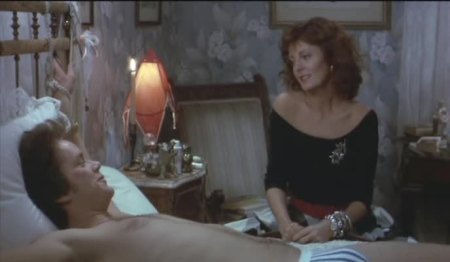 Tim here, in celebration of the silver anniversary of one of the best movies on the 1980s. On June 15, 1988, Bull Durham opened, immediately becoming one of the best-loved romantic comedy/sports movie hybrids ever made, and a quarter of a century on, it seemed like the ideal moment to look back to see just how well the quintessentially ‘80s movie has aged.
Tim here, in celebration of the silver anniversary of one of the best movies on the 1980s. On June 15, 1988, Bull Durham opened, immediately becoming one of the best-loved romantic comedy/sports movie hybrids ever made, and a quarter of a century on, it seemed like the ideal moment to look back to see just how well the quintessentially ‘80s movie has aged.
The answer, I am happy to say, is: pretty darn well, notwithstanding the set-in-stone timestamp of any movie that features Kevin Costner as a romantic lead (or features Tim Robbins looking like a 12-year-old). The chief appeal of Bull Durham remains exactly what it was 25 years ago: it really does offer something for everybody, in the words of the cliché.
At least, everybody who’s a grown-up (the film comes by its R-rating fairly, and without pandering). Sports fans have one of the best movies about baseball ever made: it opens with a literal prayer to the sport, as though it were in and of itself a deity. Romantic comedy fans get one of the best romantic triangles in the last couple generations of cinema, with a woman torn between a dopey charming boy and a cynical handsome man, neither of them transparently painted as the “bad” choice, as happens so damn often these days. Actressexuals – and I suspect that might be a larger population here than the first two – have the spectacle of Susan Sarandon giving on of her freshest, least-fussy but richest performances ever, a sexually vital woman with a curious idea of physical spirituality. Nobody else could have played it half as persuasively, in the late ‘80s or ever: the exact mix of post-hippie flakiness, maternal authority (Sarandon had a full decade on either of her co-stars; imagine that happening in a romantic comedy today) and erotic self-awareness couldn’t possibly be embodied better.

That’s what works in the film, primarily: it has strong characters, each a little idiosyncratic without stumbling into the dread Quirky, all played well by ideally-cast actors (if Sarandon gives one of her best performances, Costner is giving his absolute best performance ever, by such a margin that No. 2 can hardly be spotted). It’s quite a grown-up movie, made in the last period when such movies were regularly produced and released to broad acclaim and financial success, and by “grown-up”, I simply mean this: it is about normal-sized emotions, and humor that grows naturally up through the characters and situations without relying on extreme absurdity or over-the-top slapstick. It rewards you for being intelligent and caring about humans, without requiring that you wade into the thorny maze of lacerating art house cinema.
Not bad for a movie set in the decidedly offbeat world of minor-league baseball, where a downrent team called the Durham Bulls is struggling to maintain a winning record, chiefly aided by veteran catcher Crash Davis (Costner), and talented, undisciplined pitcher Ebby Calvin LaLoosh (Robbins). The latter of these is adopted as the season’s project by Annie Savoy (Sarandon), who picks one promising player every year to make her lover, inspiring him with her positive sexuality and erotic adoration of baseball to have the best season of his career.

There’s nothing in that scenario that screams “heavy conflict”, and that’s exactly how Bull Durham plays out: low-key, low-stakes entertainment, given depth and gravity because of Oscar-nominated writer-director Ron Shelton’s tangible love of the world he’s depicting (he was himself a minor-league player in the 1960s), not because he or any of the actors try to fool us into thinking that this is a world-changing series of events. Sure, the characters end up in very different places from where they started, but the movie’s perspective remains steadily non-urgent. These people might be changing, but baseball remains as constant as ever, and that is, in the end, the film’s biggest concern: how the sport inspires the people who are obsessed with it.
In the end, then, Bull Durham is an odd sort of love story indeed: as much about how Annie’s love of baseball deepens her life as how her love of either of two semi-professional athletes affects any of them. It’s about the things that give life meaning and shape in addition to sex and relationships, not the things that give life meaning until a relationship comes along, which makes it one of the most sensible romantic comedies imaginable. That thing is baseball, because Ron Shelton knew baseball well enough to depict it with some considerable detail and affection; but the real takeaway is that there are three people here engaging with their favorite thing, and finding long-lasting, important human contact along that way. It’s that kind of basic, genuinely nice humanity at the center of it that has kept Bull Durham a solid classic that’s still entirely delightful even after all these years.
